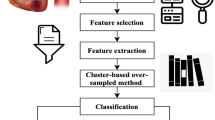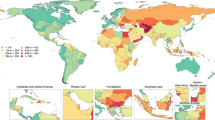Abstract
The effective method for cardiovascular disease (CVD) risk prediction is done by training the deep neural networks on the well-defined training dataset. The irregular subset from the real dataset with a greater data variance is considered for prediction. The proposed system uses the trained datasets to separate common and greatly biased subsets for accurately implementing the prediction models when many previous models are learning from the random samples of training datasets. The feature selection is done with a Binary Krill Herd meta-heuristic optimizer (B-KHA), and the extracted features are fed to the CapNet model for prediction purposes. In addition, the isolated training groups learn the network classifiers. This proposed model used the Cleveland dataset gathered from online resources. The experiment proves that the proposed model improves the network performance by appropriate prediction. The suggested model shows that the experimental outcomes perform better than the traditional machine learning algorithms, with 95% accuracy, 94% specificity, 94% precision, 97% sensitivity, 95% F1-score, and 90% Mathews’ Correlation Coefficient (MCC).






Similar content being viewed by others
Data availability
The datasets generated and analysed during the current study are available in the UCI machine learning repository.
References
Gaziano, T.A., Bitton, A., Anand, S., Abrahams-Gessel, S., Murphy, A.: Growing epidemic of coronary heart disease in low-and middle-income countries. Curr. Probl. Cardiol.. Probl. Cardiol. 35(2), 72–115 (2010)
Ramalingam, V.V., Dandapath, A., Raja, M.K.: Heart disease prediction using machine learning techniques: a survey. Int. J. Eng. Technol. 7(2.8), 684–687 (2018)
Fatima, M., Pasha, M.: Survey of machine learning algorithms for disease diagnostic. J. Intell. Learn. Syst. Appl.Intell. Learn. Syst. Appl. 9(01), 1 (2017)
Otoom, A.F., Abdallah, E.E., Kilani, Y., Kefaye, A., Ashour, M.: Effective diagnosis and monitoring of heart disease. Int. J. Softw. Eng. Appl. 9(1), 143–156 (2015)
Chaurasia, V., Pal, S.: Data mining approach to detect heart diseases. Int. J. Adv. Comput. Sci. Inf. Technol. 2, 56–66 (2014)
Vembandasamy, K., Sasipriya, R., Deepa, E.: Heart diseases detection using Naive Bayes algorithm. Int. J. Innov. Sci. Eng. Technol. 2(9), 441–444 (2015)
Parthiban, G., Srivatsa, S.K.: Applying machine learning methods in diagnosing heart disease for diabetic patients. Int. J. Appl. Inf. Syst. 3(7), 25–30 (2012)
Benjamin, E.J., Muntner, P., Alonso, A., Bittencourt, M.S., Callaway, C.W., Carson, A.P., Chamberlain, A.M., Chang, A.R., Cheng, S., Das, S.R., Delling, F.N., Djousse, L., Elkind, M.S.V., Ferguson, J.F., Fornage, M., Jordan, L.C., Khan, S.S., Kissela, B.M., Knutson, K.L., Kwan, T.W., Lackland, D.T., Lewis, T.T., Lichtman, J.H., Longenecker, C.T., Loop, M.S., Lutsey, P.L., Martin, S.S., Matsushita, K., Moran, A.E., Mussolino, M.E., O’Flaherty, M., Pandey, A., Perak, A.M., Rosamond, W.D., Roth, G.A., Sampson, U.K.A., Satou, G.M., Schroeder, E.B., Shah, S.H., Spartano, N.L., Stokes, A., Tirschwell, D.L., Tsao, C.W., Turakhia, M.P., VanWagner, L.B., Wilkins, J.T., Wong, S.S., Virani, S.S., American Heart Association Council on Epidemiology and Prevention Statistics Committee and Stroke Statistics Subcommittee: Heart disease and stroke statistics—2019 update: a report from the American Heart Association. Circulation 139(10), e56–e528 (2019)
Ismaeel, S., Miri, A., & Chourishi, D. (2015, May). Using the Extreme Learning Machine (ELM) technique for heart disease diagnosis. In 2015 IEEE Canada International Humanitarian Technology Conference (IHTC2015) (pp. 1–3). IEEE.
Kanikar, P., Shah, D.R.: Prediction of cardiovascular diseases using support vector machine and Bayesien classification. Int. J. Comput. Appl. 156(2), 8875–8887 (2016)
Siontis, K.C., Noseworthy, P.A., Attia, Z.I., Friedman, P.A.: Artificial intelligence-enhanced electrocardiography in cardiovascular disease management. Nat. Rev. Cardiol.Cardiol. 18(7), 465–478 (2021)
Anbarasi, M., Anupriya, E., Iyengar, N.C.S.N.: Enhanced prediction of heart disease with feature subset selection using genetic algorithm. Int. J. Eng. Sci. Technol. 2(10), 5370–5376 (2010)
Dwivedi, A.K., Imtiaz, S.A., Rodriguez-Villegas, E.: Algorithms for automatic analysis and classification of heart sounds–a systematic review. IEEE Access 7, 8316–8345 (2018)
Allen, L.A., Stevenson, L.W., Grady, K.L., Goldstein, N.E., Matlock, D.D., Arnold, R.M., Cook, N.R., Felker, G.M., Francis, G.S., Hauptman, P.J., Havranek, E.P., Krumholz, H.M., Mancini, D., Riegel, B., Spertus, J.A.: Decision making in advanced heart failure: a scientific statement from the American Heart Association. Circulation 125(15), 1928–1952 (2012)
Ansarullah, S.I., Kumar, P.: A systematic literature review on cardiovascular disorder identification using knowledge mining and machine learning method. Int. J. Recent Technol. Eng 7(6S), 1009–1015 (2019)
Nazir, S., Shahzad, S., Mahfooz, S., Nazir, M.: Fuzzy logic based decision support system for component security evaluation. Int. Arab J. Inf. Technol. 15(2), 224–231 (2018)
Amin, M.S., Chiam, Y.K., Varathan, K.D.: Identification of significant features and data mining techniques in predicting heart disease. Telematics Inform. 36, 82–93 (2019)
Mienye, I.D., Sun, Y., Wang, Z.: An improved ensemble learning approach for the prediction of heart disease risk. Inform. Med. Unlocked 20, 100402 (2020)
Enriko, I.K.A., Suryanegara, M., Gunawan, D.: Heart disease prediction system using k-Nearest neighbor algorithm with simplified patient’s health parameters. J. Telecommun. Electron. Comput. Eng. 8(12), 59–65 (2016)
Subhadra, K., Vikas, B.: Neural network based intelligent system for predicting heart disease. Int. J. Innov. Technol. Explor. Eng. 8(5), 484–487 (2019)
Tarawneh M, Embarak O. Hybrid approach for heart disease prediction using data mining techniques. In Advances in Internet, Data and Web Technologies: The 7th International Conference on Emerging Internet, Data and Web Technologies (EIDWT-2019). Springer International Publishing. 2019; 447–454
Jagtap, A., Malewadkar, P., Baswat, O., Rambade, H.: Heart disease prediction using machine learning. Int. J. Res. Eng. Sci. Manag 2(2), 352–355 (2019)
Kim, J.K., Kang, S.: Neural network-based coronary heart disease risk prediction using feature correlation analysis. J. Healthc. Eng. (2017). https://doi.org/10.1155/2017/2780501
Pescatello, L.S., Wu, Y., Panza, G.A., Zaleski, A., Guidry, M.: Development of a novel clinical decision support system for exercise prescription among patients with multiple cardiovascular disease risk factors. Mayo Clin. Proc. Innov. Qual. Outcomes 5(1), 193–203 (2021)
Rubini PE, Subasini CA, Katharine AV, Kumaresan V, Kumar SG, Nithya TM. A cardiovascular disease prediction using machine learning algorithms. Ann. Roman. Soc. Cell Biol. 2021;904–912.
Kumar, A., Priyanka, S., Dhanashree, K., Praveen, V., Rekha, R.: Efficient binary grasshopper optimization-based neural network algorithm for bitcoin value prediction. Int. J. Nonlinear Anal. Appl. 13, 53–60 (2022). https://doi.org/10.22075/ijnaa.2022.6330
Arunachalam, S.K., Rekha, R.: A novel approach for cardiovascular disease prediction using machine learning algorithms. Concurr. Comput. Pract. Exp. 34(19), e7027 (2022)
Kumar, A.S., Rekha, R.: An improved hawks optimizer based learning algorithms for cardiovascular disease prediction. Biomed. Signal Process. Control 81, 104442 (2023)
Singh A, Kumar R. Heart disease prediction using machine learning algorithms. In 2020 international conference on electrical and electronics engineering (ICE3). 2020, (pp. 452–457). IEEE.
Saran Kumar, A., Chandrakala, D.: A survey on customer churn prediction using machine learning techniques. Int. J. Comput. Appl. 975, 8887 (2016)
El Boujnouni, I., Harouchi, B., Tali, A., Rachafi, S., Laaziz, Y.: Automatic diagnosis of cardiovascular diseases using wavelet feature extraction and convolutional capsule network. Biomed. Signal Process. Control 81, 104497 (2023)
Kanagarathinam, K., Sankaran, D., Manikandan, R.: Machine learning-based risk prediction model for cardiovascular disease using a hybrid dataset. Data Knowl. Eng.Knowl. Eng. 140, 102042 (2022)
Reddy, K.V.V., Elamvazuthi, I., Aziz, A.A., Paramasivam, S., Chua, H.N., Pranavanand, S.: An efficient prediction system for coronary heart disease risk using selected principal components and hyperparameter optimization. Appl. Sci. 13(1), 118 (2023)
Aydemir, S.B.: A novel arithmetic optimization algorithm based on chaotic maps for global optimization. Evol. Intell.. Intell. 16(3), 981–996 (2022)
Düznli̇e, T., Onay, F.K., Aydemi̇r, S.B.: Improved honey badger algorithms for parameter extraction in photovoltaic models. Optik 268, 169731 (2022)
Author information
Authors and Affiliations
Corresponding author
Additional information
Publisher's Note
Springer Nature remains neutral with regard to jurisdictional claims in published maps and institutional affiliations.
About this article
Cite this article
Kumar, A.S., Rekha, R. A Dense Network Approach with Gaussian Optimizer for Cardiovascular Disease Prediction. New Gener. Comput. 41, 859–878 (2023). https://doi.org/10.1007/s00354-023-00234-1
Received:
Accepted:
Published:
Issue Date:
DOI: https://doi.org/10.1007/s00354-023-00234-1




